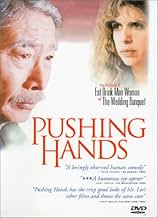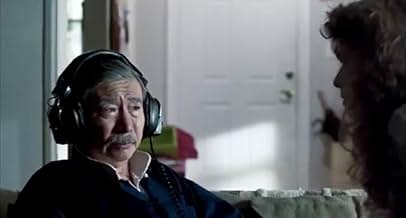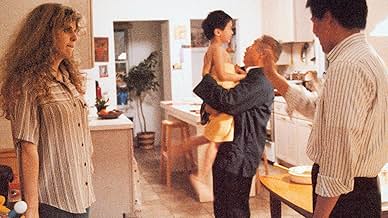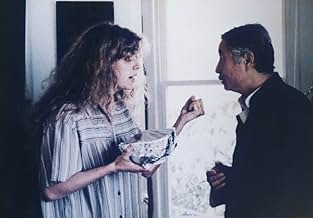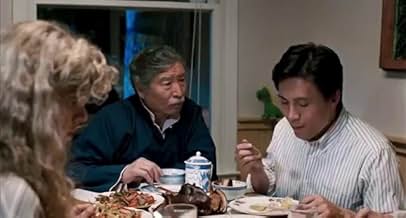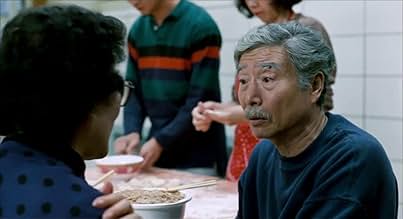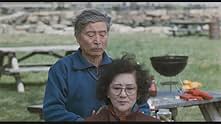VALUTAZIONE IMDb
7,2/10
5129
LA TUA VALUTAZIONE
Aggiungi una trama nella tua linguaAll the while, Master Chu tries to find his place in the foreign American world.All the while, Master Chu tries to find his place in the foreign American world.All the while, Master Chu tries to find his place in the foreign American world.
- Regia
- Sceneggiatura
- Star
- Premi
- 6 vittorie e 7 candidature totali
Bozhao Wang
- Alex Chu
- (as Ye-tong Wang)
Recensioni in evidenza
Tuei Sho(Pushing Hands) is Ang Lee's first film after graduation, and the first episode of his "Triad of Father." In spite of its status as an early work, it manifests subtlety, elegance and articulation in narration style constantly seen in his latter works. Everyone, whether seen this film or not, can tell that it's about the bondage and gap of affection, relation and interaction within family, but it's more than that. It also tells about culture, not only the apparent differentiation, but the shift within a man's life, the time and the whole modern history of China. If you understand Chinese(language, culture and history), it is delicately overwhelming. If not, it's still amiable and a bit exotic. Tuei Sho is so worth viewing and contemplating again and again.
Ang Lee's first feature film, compared to "Eat Drink Man Woman," is a bit too neat and plain, but it still possesses the characteristic traits of Lee's later films - quiet and plain, yet captivating. It's truly miraculous that if this son were placed in another director's film, he would undoubtedly be detested, yet under Lee's direction, he evokes a sense of weakness without crossing into detestable territory. "The sun is shining, and I just want to stand here for a while. After all, no one is waiting for me. I'll forget about it after standing here for a while." This reminds me of my grandmother, who moved from her hometown to the city and struggled to adapt. Two weeks later, she insisted on going back. During most of the daytime, she would just sit on the balcony, soaking up the sun. I wonder what she was thinking at that time. Initially, I thought it was about cultural barriers, but later I realized it was much sadder. Cultural barriers can be temporarily overlooked through the efforts of both sides, but time and aging are forces that cannot be resisted.
10bagua-2
Rarely have I seen the highest level of martial arts, internal kung-fu, portrayed in it's proper perspective. It is hard these days for people to realize that 'soft' style kung-fu will enable an old man to defeat many young men without much effort. With all the silly 'wire-fu' out there in the movies most people have no idea that there is a subtle way to defeat strength through 'chi energy' power lines.
There is no question that Ang Lee has the ability to put kung-fu back at the top of the martial art world. Through his well thought out story line and his perfect blend of drama and comedy he has taken a deep look at the struggle that exists today for thousands of people as they care for their elderly parents. This is truly a movie that can bond many generations.
There is no question that Ang Lee has the ability to put kung-fu back at the top of the martial art world. Through his well thought out story line and his perfect blend of drama and comedy he has taken a deep look at the struggle that exists today for thousands of people as they care for their elderly parents. This is truly a movie that can bond many generations.
10Matador
Pushing Hands is Ang Lee's beautiful film about an elderly Chinese man transplanted into his son's American home. While most films about this subject, which for some reason critics like to call "East meets West", hyperbolize the struggles that immigrant Chinese must face, Pushing Hands tends to focus on minutia instead. For example, the elderly grandfather does not know that tin foil cannot be put into the microwave, which leads to a scolding by his caucasian daughter-in-law. All the conflict in the film is grounded in the real world, as opposed to some very abstract 'generational conflict'. Because of this I found this film to be much more rewarding than most other films about Asian-Americans. A must-see for Chinese-Americans and Caucasians alike. Personally, I'd like to watch it with my Chinese grandparents.
Listen for James Schamus's cameo as the voice on the answering machine at the beginning of the film.
Listen for James Schamus's cameo as the voice on the answering machine at the beginning of the film.
'Pushing hands' refers to an exercise in tai chi where lightly touching each other, two practitioners learn to yield to and redirect a shared flow of energy. It's actually at the core of tai chi, a Chinese form of boxing built around Taoist principles of interconnected balance of opposites and emptiness in form.
Nearly impossible to make sense of in film, as is meditation and other internal arts of the East, because simply showing it, or worse in the light of mystical ability, obscures what it really is about. Ang Lee however tries in his first film, with mixed results.
Modeled to the story of an aging tai chi master who comes to America to stay with his son's family, there is what you'd expect from a film where East comes West; contrasts between two opposite ways of life, tradition versus modernity, love versus duty.
All that is pretty ordinary, and some obvious drama and questionable acting bring it further down. To be fair, for a low-budget student film, Lee shows considerable talent with a camera and has come far on this strength. All told, I'd rather celebrate his success story than Tarantino's. But let's see something more interesting from the Chinese perspective.
The overall point is finding a center of stillness in imbalanced life that is constantly in motion; in the film we see this in the old master's quest for a home and new life in a new country, somewhere to grow roots. This is the tao of balancing in the flow.
Life back in China isn't presented as ideal, we find that the old man has been persecuted all his life, and that his tai chi and calligraphy are the still spot he cultivates, his center in a moving universe of suffering. See how a phone ringing startles him from meditation, that is life that goes on.
In line with tai chi principles, all this means 'hard' in several moments of real life conflict, versus 'soft' in inwards reflection. There is a love interest in Mrs. Chen (soft, as feminine yin to his yang) who's in a similar situation as the old man and much gentle pushing and yielding to be close to her.
So how beautiful, if we could have the film as cinematic 'pushing hands' between lonely souls? And carry the flow from heavy drama to soft inner life, to what these people do to cool and express their ardor, she in her cooking, he in his calligraphy. Kar Wai makes it work, not quite so here.
Why is that? There's a scene of the old man watching videotapes of old Chinese kung fu movies, ridiculous from his perspective. The film is meant to offer next to other things a realistic depiction of his arts, fighting or otherwise, tied to realistic human connection as both soft.
But there are scenes like with the fat boy or in the restaurant, that in the end are as ridiculous as those movies, suddenly jerking us to fiction, obscuring what is vital in his art; and mirroring that, there's a sense of inflated drama in emotional moments. But Lee is too talented for us to be able to easily discard the whole work.
The Western perspective, introduced later in the film by the son, is that his father's internal arts may be his way of shutting off the outside world, keeping from being touched perhaps related to the tragic loss of his wife. All through the film, we see that he likes Mrs. Chen but is reluctant to be close to her.
Now watch again the last scene where he teaches tai chi in the Chinese community center, now the 'hero of Chinatown'. Watch how we first see him doing the motions, then with a soft flow of the camera materializes behind him as though out of thin air an entire class of students. And who enters as if by chance? Mrs. Chen.
Now 'soft' is what we see of his heart, 'hard' what we imagine as taking place in his head.
See how lightly the real and unreal touch, how smooth the parallel flow. So you can afford to miss the rest but not this last moment, it's expertly done and too delicious to ignore.
Nearly impossible to make sense of in film, as is meditation and other internal arts of the East, because simply showing it, or worse in the light of mystical ability, obscures what it really is about. Ang Lee however tries in his first film, with mixed results.
Modeled to the story of an aging tai chi master who comes to America to stay with his son's family, there is what you'd expect from a film where East comes West; contrasts between two opposite ways of life, tradition versus modernity, love versus duty.
All that is pretty ordinary, and some obvious drama and questionable acting bring it further down. To be fair, for a low-budget student film, Lee shows considerable talent with a camera and has come far on this strength. All told, I'd rather celebrate his success story than Tarantino's. But let's see something more interesting from the Chinese perspective.
The overall point is finding a center of stillness in imbalanced life that is constantly in motion; in the film we see this in the old master's quest for a home and new life in a new country, somewhere to grow roots. This is the tao of balancing in the flow.
Life back in China isn't presented as ideal, we find that the old man has been persecuted all his life, and that his tai chi and calligraphy are the still spot he cultivates, his center in a moving universe of suffering. See how a phone ringing startles him from meditation, that is life that goes on.
In line with tai chi principles, all this means 'hard' in several moments of real life conflict, versus 'soft' in inwards reflection. There is a love interest in Mrs. Chen (soft, as feminine yin to his yang) who's in a similar situation as the old man and much gentle pushing and yielding to be close to her.
So how beautiful, if we could have the film as cinematic 'pushing hands' between lonely souls? And carry the flow from heavy drama to soft inner life, to what these people do to cool and express their ardor, she in her cooking, he in his calligraphy. Kar Wai makes it work, not quite so here.
Why is that? There's a scene of the old man watching videotapes of old Chinese kung fu movies, ridiculous from his perspective. The film is meant to offer next to other things a realistic depiction of his arts, fighting or otherwise, tied to realistic human connection as both soft.
But there are scenes like with the fat boy or in the restaurant, that in the end are as ridiculous as those movies, suddenly jerking us to fiction, obscuring what is vital in his art; and mirroring that, there's a sense of inflated drama in emotional moments. But Lee is too talented for us to be able to easily discard the whole work.
The Western perspective, introduced later in the film by the son, is that his father's internal arts may be his way of shutting off the outside world, keeping from being touched perhaps related to the tragic loss of his wife. All through the film, we see that he likes Mrs. Chen but is reluctant to be close to her.
Now watch again the last scene where he teaches tai chi in the Chinese community center, now the 'hero of Chinatown'. Watch how we first see him doing the motions, then with a soft flow of the camera materializes behind him as though out of thin air an entire class of students. And who enters as if by chance? Mrs. Chen.
Now 'soft' is what we see of his heart, 'hard' what we imagine as taking place in his head.
See how lightly the real and unreal touch, how smooth the parallel flow. So you can afford to miss the rest but not this last moment, it's expertly done and too delicious to ignore.
Lo sapevi?
- BlooperThe son, Alex, has physiognomy that is unmistakably that of someone Beijing, and the actor speaks with a Beijing accent, but the father, who demonstrates Taiwanese cultural practices, has the appearance of someone from farther south, such as near Shanghai. Regardless of whom the father might have married, the couple could not have produced a child with such Northern characteristics. This is a casting error more than a character error.
- ConnessioniFeatured in Century of Cinema: Naamsaang-neuiseung (1996)
I più visti
Accedi per valutare e creare un elenco di titoli salvati per ottenere consigli personalizzati
- How long is Pushing Hands?Powered by Alexa
Dettagli
- Data di uscita
- Paesi di origine
- Lingue
- Celebre anche come
- Pushing Hands
- Luoghi delle riprese
- Aziende produttrici
- Vedi altri crediti dell’azienda su IMDbPro
Botteghino
- Budget
- 400.000 USD (previsto)
- Lordo Stati Uniti e Canada
- 152.322 USD
- Fine settimana di apertura Stati Uniti e Canada
- 9567 USD
- 4 giu 1995
- Lordo in tutto il mondo
- 152.322 USD
Contribuisci a questa pagina
Suggerisci una modifica o aggiungi i contenuti mancanti



